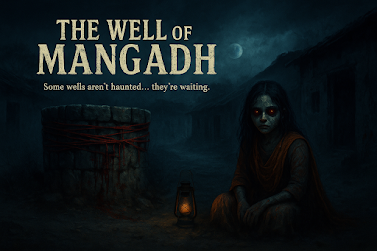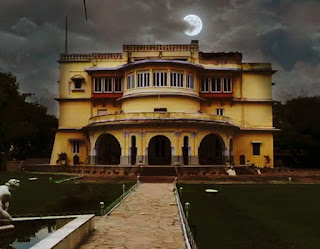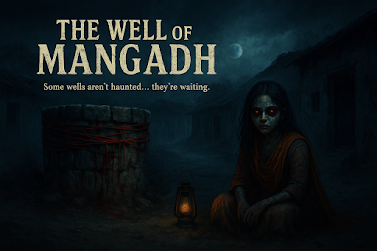
I’ve seen things I wish I could forget.
And it all started with a well.
A cursed well, in a forgotten village of Rajasthan called Mangadh.
This isn’t a horror script. This is my story.
And if you’re reading this—don’t laugh it off.
Because I did.
And I barely made it out alive.
I’m Saif, and my life’s work is documenting the raw, unsettling truth. My lens has captured more shadows than sunlight, each frame a testament to the unseen, the unspoken, the downright terrifying. People call me a filmmaker, an explorer, sometimes even a madman. But mostly, I’m just a man who can’t look away from the darkness that clings to forgotten corners of this world. And none of those corners have ever clawed at my sanity quite like the Haunted village in Rajasthan – Mangadh.
Mangadh A Village That Time Forgot
I arrived in Mangadh on a winter morning. I was working on a documentary series about India’s most isolated villages. Mangadh was barely on any map—just a cluster of mud houses surrounded by desert.
People were nice, at first. But they spoke in whispers, avoided eye contact, and one thing was very clear:
“Nobody went near the old well”.
It stood right in the center of the village, sealed with red sacred threads and crushed lemons. There was something sickly about it—like the air around it was… thicker.
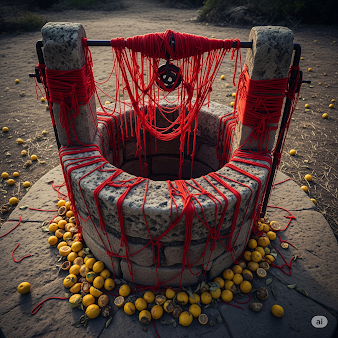
When I asked about it, a woman spat on the ground and muttered,
“That well drinks souls. Ask about it, and you’ll be next.”
I thought she was just being dramatic. But curiosity is a disease. And I was already infected.
The Cruel Story of Champa – The Daayan They Created
That night, under a sky so black it seemed to swallow the stars, an old man, his hands trembling like autumn leaves, finally whispered the truth. His voice shook as he spoke
“Champa was just a child,” he began, his gaze fixed on the flickering lamplight, as if he was afraid to look anywhere else. “Barely twelve. Poor. Beautiful. Too beautiful for this cursed place.” His eyes darted towards the direction of the well, then quickly back to me, She had eyes that held the innocent wisdom of the ancient lands and a laugh that could make even the most hardened elder crack a smile. She spent her days helping her mother with meager chores, often stealing moments to play by the very well that would later become her tomb, chasing dragonflies with bare feet.
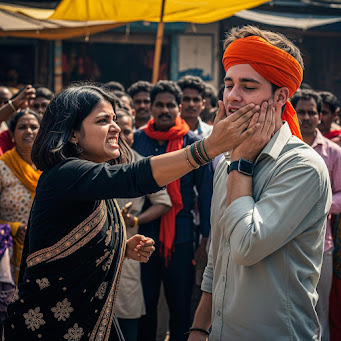
one day while she was returning to her home after buying some grocery, there was a guy who was following her “The landlord’s son “Viren“. He use to like Champa and was deeply in one sided love with her. viren whisper filthy things while following champa and she slapped him in the village square. A girl slapping a Thakur’s son? That’s all it took.”
“The next full moon, they came for her. Dragged her from her home, her screams swallowed by the night. They tied her hands, accused her of being a daayan. A witch. Said she bewitched Viren, made his limbs weak.” His voice dropped to a barely audible whisper, thick with unspoken horrors.
They took her to the well. They hung her upside down above it. Tortured her. And then dropped her… headfirst. Let her die in darkness.
“But before she died… she swore to return.”
The villagers, in a desperate, futile attempt to bury their guilt, sealed the well with their flimsy mantras and blood-red threads. They left her down there—her bones, her blood, and a raw, festering rage, all buried together in that cold, wet tomb.
Things That Shouldn’t Happen… Happened
Every fiber of my being screamed at me to leave. I knew it then, and I know it even more now. But the storyteller in me, the insatiable hunger for the chilling truth, kept me rooted. I needed the footage. I needed proof. A record of the monstrous act they had committed.
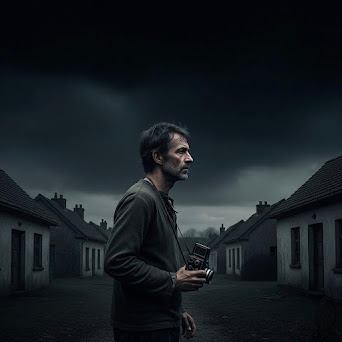
At precisely 3:12 a.m., that desolate hour when the veil between worlds thins, I crept out with my camera. The sky was a suffocating blanket of black, not a single star to offer solace. The wind, which usually rustled through the desert, was unnaturally still, holding its breath.
And then I heard it. A faint, childish voice, singing. It wasn’t just the wind, it was a sound, carried on the stagnant air from the direction of the well. A lullaby, sweet and sorrowful, yet utterly chilling in its context:
Jal mein soja re, naina moonde re
(Sleep in the water, close your little eyes)
Raat ki chhaya mein, koi na pooche re
(In the shadow of night, no one will ask why)
Paani ka jhoola hai, neend ka raahi
(The water is your cradle, sleep is your path)
Ma ka anchal ab, ban gaya paani
(Mother’s embrace is now the drowning tide)
Tu hansa tha jab, ve log hanse the
(When you smiled, they all laughed too)
Ab tu roya hai, sab chup baithe re
(Now you cry, and all sit in silence)
Aa re chhoti chhoti chaaya le jaaun
(Come, let me carry away your little shadow)
Jal mein soja re… main phir se gaaun
(Sleep in the water… so I may sing again)
As I neared the well, a sickening pressure built in my ears, as if the air itself was condensing around me. My flashlight, a weak beacon against the encroaching darkness, dimmed, its beam struggling to cut through the oppressive gloom. And then I saw it, scrawled on the very rim of the well, glistening wetly in the faint light – written in what could only be blood. It read:
“Main zinda hoon.” (I am alive.)
I lowered my camera down.
At first, nothing.
Then… hair. Long, wet, matted black hair floating on the surface of the well water.
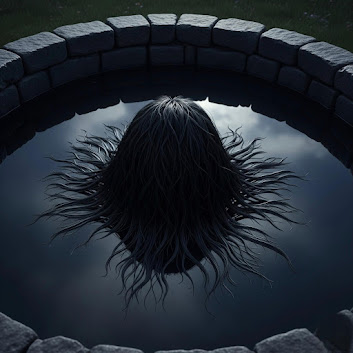
And then… her face.
Bloated. Pale. Eyes wide open. Blood leaking from her scalp.
She smiled.
And then she screamed. It wasn’t human. It was a guttural, ancient shriek that tore at my eardrums, echoing from the water, from the stone walls of the well, from every shadow around me. It was the sound of pure, unadulterated vengeance.
I dropped the camera and ran like hell.
The Village Began to Die
The next morning, four goats were found dead. Their eyes had been gouged out, their bodies arranged in a macabre circle around the cursed well.
That night, a man was found sitting by the well, his mouth choked full of sand. Dead. A final, silent protest against an unspeakable horror.
By the third day, over a dozen villagers had fled.
By the fifth, all were gone. Except me.
And I saw her again.
In the mirror. In my dreams. In every shadow that moved slightly too slow.
She whispered to me, always:
“Tell them. Tell the world what they did to me. Or I’ll never stop.”
I Tried to Leave… She Followed
I finally packed up to leave. But the road… didn’t lead out. It kept circling me back to Mangadh.
And my phone? The screen would flicker incessantly between two terrifying images:
My own face, haggard and terrified, eyes wide with a primal fear I couldn’t escape.
A photo of Champa—but as a child, smiling, innocent, her eyes full of life. The last known picture of her, taken just days before they dragged her to her watery grave. A chilling reminder of what they had stolen.
On the 8th day, I found a note on my bed, written in old Hindi. The ink seemed to bleed into the paper, as if it were still wet, still alive:
“Woh paani mein hai, magar pyaasi hai.” (She lives in the water, but she’s still thirsty.)
I didn’t sleep that night. And when dawn finally broke—a pale, sickly light that offered no warmth—I was no longer alone in the room.
She was sitting on the stair case.
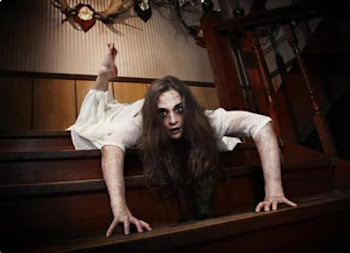
Her neck twisted, Legs bent the wrong way, Hair dragging across the floor and she just said one thing:
“Tu jaayega. Lekin tu mujhe le jaayega.” (“You’ll leave. But you’ll take me with you.”)
I Escaped Mangadh. But She Didn’t Let Go.
I managed to leave on the 9th day. Somehow. But since then, I’ve seen her in reflections. In the bathtub. In puddles after rain.
Water isn’t safe anymore.
Because that’s where she waits.
The footage I shot? Corrupted.
The villagers? Vanished. Mangadh is now marked as “abandoned” on government records
They thought they killed a witch.
But they created a monster.
If You Ever Hear Her Song… Don’t Answer.
She sings when she’s close.
A lullaby about wells and fireflies and lost love.
If you hear it, it’s already too late.
They killed her because she fought back.
They called her a witch when they were the real monsters.
Now, she is one.
Not a ghost.
Not a daayan.
But something older, deeper, and far more dangerous.

